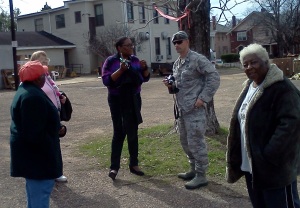Keeping Courage
I’ve just spent the past three days crossing the Southern tier states of Louisiana, Mississippi, and Alabama into Georgia. I’ve spent precious time with relatives – kin by birth and kin by choice and community. Along the slow roll of land falling toward and then rising up from the Mississippi River’s reliable flow I found story after story, learning after learning.
- In the three years since I last drove these Southern highways a few things have changed
- Gas is WAY more expensive – but y’all probably noticed that yourselves.
- Radio stations toward the low numbers on the FM dial are both more plentiful and more uniformly Christian and Mexicano/Latino. And, in the spirit of transparency – yes, I’ve discovered this while looking for NPR (far more scarce the dial near Austin, but pretty reliably accessible in eastern MS and across AL & GA. I have no explanation, but a few theories of the ilk that only arise when a mind has too many miles and little to do. I’ll spare you.)
- More highway work is underway, often with signs indicating funding with stimulus money.
- I drove into Jackson, MS after dark and up to the house where I’ve visited my 88 year old uncle and 84 year old aunt for decade upon decade. There were daffodils blooming in the front yard. There was a piece of white paper among an abundance of cookies on the dining table (in their svelte aging bodies my uncle and aunt are eating whatever they want, now). On the paper was a rough drawing of daffodils beneath the words “Happy Valentine’s day. I love you.” My uncle had drawn it for my aunt when he woke up to rain and was afraid he’d sink to his knees if he went out to get the real thing. Visits with people who’ve seen this many years, visits with people who I have known my whole life, these are unspeakably precious – a value I imagine I’ll only come to understand more deeply as my own time goes by.
- In Montgomery, I found my way to the main offices of the Faith Crusades Montgomery Rescue Mission and my friend Michelle Browder (Voice 053). Twenty years ago Mrs. Buena Browder (Voice 52) and Chaplain Curtis Browder established the Mission and today they provide safe houses for women and alternative housing for homeless people and food for the impoverished families of Montgomery. Just as Michelle and I met up at the Mission,
 officers from the Maxwell Air Force Base pulled into the parking lot. They had a load of winter coats they’d collected on the base for donation to the people served by the Mission. This is the way community works. It happens every day all over our country. Sacks of fresh food in the arms of family members. Beautiful coats draped across beautiful shoulders. Everyone is warmer for it.
officers from the Maxwell Air Force Base pulled into the parking lot. They had a load of winter coats they’d collected on the base for donation to the people served by the Mission. This is the way community works. It happens every day all over our country. Sacks of fresh food in the arms of family members. Beautiful coats draped across beautiful shoulders. Everyone is warmer for it.
- Soon we were downtown and sitting together on a sofa frequented historically by Mrs. Rosa Parks. The couch is now in the bookstore of New South Books publishing house and bookseller focused on distributing books “which examine the role of individuals in creating or contending with the change and conflict which came to the region in the post-World War II era. We believe strongly in the transformative power of information and knowledge, and we hope that the books we publish offer collective insight that helps the region grow toward ‘the beloved community’ and the fulfillment of the democratic promise.” These are the words of Randall Williams, co-owner and lifetime activist for civil rights who sat and talked with us for over an hour. Tuskegee Air Men, the poetry of John Beecher, the traditions of the Civil Rights Movement waiting to cradle new consciousness, new action. Mr. Williams knows and trusts that the people of Alabama and the entire country have much to learn from the South.
- Then came another profound experience. Michelle took me to visit an organization for which she has become a committed supporter – the Equal Justice Initiative (EJI), headquartered in Montgomery. Since the early 80’s, Brian Stevenson and his colleagues have given every bit of their energy to litigation “on behalf of condemned prisoners, juvenile offenders, people wrongly convicted or charged with violent crimes, poor people denied effective representation, and others whose trials are marked by racial bias or prosecutorial misconduct. EJI works with communities that have been marginalized by poverty and discouraged by unequal treatment.” Specifically and recently, EJI has pursued and prevailed in Federal Supreme Court Cases proving the life sentencing of young juveniles to be cruel and unusual conduct, thus violating the 8th Amendment. In March of this year EJI will take forward a related case to the highest court of the land, again advocating for the rights of young offenders.
- All of this is everyday life in Montgomery. Right alongside the conversation I heard behind me at a coffee shop – a first-time internet date – the couple speaking in those tentative, awkward and perfectly endearing ways – “I never knew you’d be this pretty.” “Yes, I’d love a Carmel Macchiato, thank you.” “My first wife…well, I cheated on her with somebody else. I apologized but I never expected her back. I was wrong and I don’t want to ever do that again…that is, if I get another chance…I sure hope I get another chance.”
- Next was my conversation with the man in the thrift shop. Joseph said, “I came here from the Philippines in 1973 – went all over the country. Now I am here.” He looked down at the cover of 100 VOICES – AMERICANS TALK ABOUT CHANGE. “The only change from here on will be bad change. There’s no hope. We’re in the end times.” “What makes you continue on with that being the case?” I asked. “It’s the grace – the grace of God that gives us all a chance with these last days to repent and be saved. Do you believe it? Do you believe there is no hope?” “No,” I said. Joseph looked at me, waiting for an explanation. “I drove around the country to listen to people. I know there are good strong hearts out here and that gives me only hope. Maybe it is the end – the end of a pretty awful time, but I can’t believe it’s the end of the human experience. There’s too much evidence of resilience.”
- I looked around me at the thrift shop. I thought of the many conversations Michelle and I had shared that past afternoon and evening. Michelle wasn’t fooling herself into some illusion that the people of Montgomery are energized and directed. She knows there is a powerful drag on the dignity and initiative of individuals and the community as a whole. But she doesn’t give up. She knows and employs the power of relationship. She loves the kids she works with in area high schools and churches and they know it. Michelle can’t do it for them, but she can and does relate directly with the dignity of every person with whom she has business. The people advocating for prisoners in EJI work to correct injustice, Michelle works to prevent it in the first place.
I am again profoundly moved by my time in the South and, in particular, with the Browder family in Montgomery. On my drive into Georgia I spent a lot of time wondering how we all support one another to keep our courage.
The Browders have and live deep faith. They place their faith into daily and generative practice. And like Kwang Kim suggested as Voice 100 in 100 VOICES – AMERICANS TALK ABOUT CHANGE, they live with passion and with energy renewed by faith and by communion with others. Their passion is contagious.
And still, there is fatigue. Michelle spoke of recently visiting the new King Memorial in our nation’s capital. “I wept,” she said, so weary but never giving up.
I believe in Michelle. I believe in her parents and in EJI. I believe in Randall Williams and New South Books. I believe my uncle’s love for my aunt – in their love for me. We stay courageous by believing in and loving one another.
Today in Decatur, GA I went with my mother to her church. The minister spoke about a scripture in the Old Testament – 2Kings 2: 1-14. It was a story of a young prophet and his mentor. The younger kept saying, “I’m not letting you out of my sight.” And he didn’t. He watched and learned through seeing his mentor’s actions and through communion – through their relationship entirely in support of one another. I will now always support and learn from the people I’ve been with as I’ve journeyed across the South. All are relatives and all are mentors. From this I gain courage.
 Clare Consultation, LLC
Clare Consultation, LLC
As I read these, change seems more and more connected to coming home to values, and those values more and more connected to our sense of place – the places where we came to know and can recognize and remember values. So moving forward, change, is something like a lightning rod to deep, deep memories. And I realize also how very little I know of this country’s places. These listenings make me wish to see these places and their memories.
Here, from the red clay of many of my ancestors, I am learning and learning. My mentor Mayme Porter said, “We don’t really learn anything. We remember what we’ve always known.”